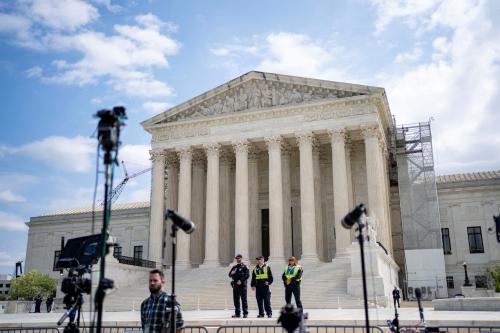INTRODUCTION
Situations of mass displacement are initially humanitarian crises that threaten the physical survival and well-being of the displaced. The immediate response is largely about overcoming the fundamental threat that displacement poses to one’s life by providing protection and assistance in finding adequate shelter, food, medical treatment, and other essentials to those individuals and groups of individuals who have been forced to flee their homes and communities for safety elsewhere. However, the forcible displacement of persons, both inside and outside the borders of their own countries, is a complex phenomenon with dimensions that go beyond the humanitarian, particularly as the duration of displacement increases. For instance, mass displacement of a country’s civilian population can have negative impacts on economic growth, poverty reduction, and governance that typically require development strategies and responses. In addition, comprehensive responses to displacement and the protection of displaced persons also involve and require efforts to promote peace, reconciliation, and justice.
The success of peacemaking and efforts to overcome the effects of conflict, violence, and mass atrocities and human rights violations that give rise to displacement are inextricably linked to addressing the interests, needs, and vulnerabilities of those displaced by these phenomena.[1] In many instances, the scale and the impact of displacement due to conflict, violence, and mass atrocities and human rights violations can be so great that no realistic plan to bring about peace as well as reconciliation and recovery and development over the long-term can ignore the justice-related needs of displaced persons. The promotion of the rule of law along with justice and accountability also play an essential role in creating the necessary conditions for achieving “just returns” and other durable solutions.[2] Many victims of conflict and displacement identify justice as one of their most pressing needs as they seek to rebuild their lives.[3] This includes the need for a predictable and equally applied set of rules and laws that guarantee and protect their fundamental rights and freedoms. Addressing these justice needs and the promotion of the rule of law are fundamental to the protection of displaced persons.[4]
This paper explores the nexus between justice and displacement in an effort to develop a common understanding of justice and accountability measures as an integral part of comprehensive responses to conflict-induced displacement and the protection of internally displaced persons, including efforts to achieve solutions to displacement that are voluntary, dignified, and just, and therefore durable. It will also address how various justice and accountability measures associated with transitional justice have acknowledged and addressed the needs of displaced persons around the world and have included victims of displacement in their work. It will begin, however, by providing a brief overview of forced displacement, with a focus on the situation of internally displaced persons and violations of their human rights.
[1] Brookings-Bern Project on Internal Displacement, Addressing Displacement in Peace Processes, Peace Agreements and Peace-Building Peacemaking (September 2007).
[2] Megan Bradley, “Back to Basic: The Conditions of Just Refugee Returns’” Journal of Refugee Studies, vol. 21, no. 3 (2008).
[3] William G. O’Neill, “Rebuilding the Rule of Law after Identity-Based Conflict: What Responsibility to Protect Practitioners Will Confront,” Global Responsibility to Protect, vol. 1 (2009) at 478-505.
[4] Justice for a Lawless World? Rights and Reconciliation in a New Era of International Law: Interview with Dennis McNamara, IRIN, available at http://www.irinnews.org/InDepthMain.aspx?InDepthId=7&ReportId=59452



Commentary
Justice, Accountability, and the Protection of Displaced Persons
December 1, 2009